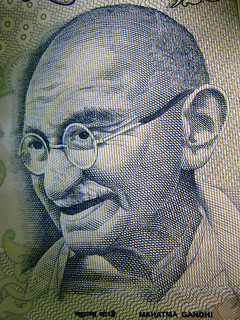
Gandhi
When to Turn the Other Cheek and When Not To
Sometimes, when we are confronted with negativity in a personal context, the best course of action is non-action or non-violence. Rather than getting drawn into a situation where the goal of our opponent is to taunt us into doing something foolish that will be used against us later, the wisest choice we can make is to not react in any way. If we don’t permit ourselves to be drawn into a toxic embrace we can’t be showered with toxic energy. Since no blow has been struck, we’re under no obligation to defend ourselves. If we can maintain our self-control and not let our ego react as our adversary hopes it will, we will escape the danger he hopes to bring our way. In this kind of situation it is best to do as Christ advised and turn the other cheek. Keep cool. Do not react. Move on.
Gandhi and Non Violence
There are also times when we cannot afford to turn the other cheek, practice non-violence and walk away but instead must take a stand and actively resist evil. Sometimes, the right way is to stand and fight against an encroaching darkness in order to create a lasting peace and a freedom that endures. During World War Two, for example, many in India wanted Nazi Germany to win the war. Those who supported this position did so because they felt that if the Nazis won the war, the British would be forced out of India. While this may have been true, what they failed to realize was that if the Nazis replaced the British in India things would get worse for the Indian people, not better. Others wanted to apply Gandhi’s philosophy on non-violence to opposing a potential Nazi invasion, even though Gandhi himself had said that ahimsa, or non-violence, would not work against the Nazis because they were an immoral political force with no conscience.
Aurobindo
Like Gandhi, Sri Aurobindo, an Indian spiritual teacher of wide vision, also saw the folly in either supporting a Nazi invasion or opposing it with non-violence. Aurobindo, moreover, perceived the Second World War as part of an ongoing cosmic struggle of good versus evil in the world. Nazi Germany had to be opposed and defeated or the world would be shrouded in darkness and the flame of freedom extinguished everywhere. With the outbreak of hostilities he was certain that the fate of the world hung in the balance. In keeping with his vision, Aurobindo raised money for the British war effort and called on his fellow Indians to actively fight the Nazis, not with non-violence but with armed force.
Aurobindo’s strong and vocal support for the British was most remarkable considering that as a young man he had been a firebrand and a political radical, extolling the use violence to secure India’s independence from British rule. However, instead of securing India’s freedom he had been captured by the British and tried for sedition. If he had been convicted of the charges brought against him he would have been executed, but he was acquitted instead. His acquittal marked his renunciation of violence and the beginning of his spiritual path.
Although Aurobindo had been devoted to peace for two decades before the war began, he knew that non-violence as a defensive strategy would insure a potential Nazi conquest of India rather than defeat it. Faced with a ruthless foe, he resolved to stand and fight the tide of evil that was determined to overwhelm the world. Peace at any price was simply too high a price to pay for a peace that would be intolerable.
The Munich Pact
This truth was never more evident than in the early days of the war. In September 1938, Neville Chamberlain, the Prime Minister of Great Britain, attempted to appease Hitler and forestall further conflict by conceding the Sudetenland to him. The Sudetenland was a region of disputed territory in Czechoslovakia that contained a large German speaking population. Hitler was delighted to accept Chamberlain’s concession, which the parties formalized in a treaty of non-aggression, known as the Munich Pact. Chamberlain then made a famous speech proclaiming “peace in our time.” Unfortunately, that peace lasted only a short time. In March of 1939 Hitler invaded Czechoslovakia and then rolled over the rest of Europe. In Britain, Chamberlain’s policy of appeasement brought down his government and returned Winston Churchill to power.
For many years before the war began, Churchill, like Aurobindo, had seen the threat of Nazi Germany for what it was. Both men took unpopular positions far in advance of their fellow countrymen. They both knew it was folly to appease an evil that sought the destruction of freedom and liberty.


